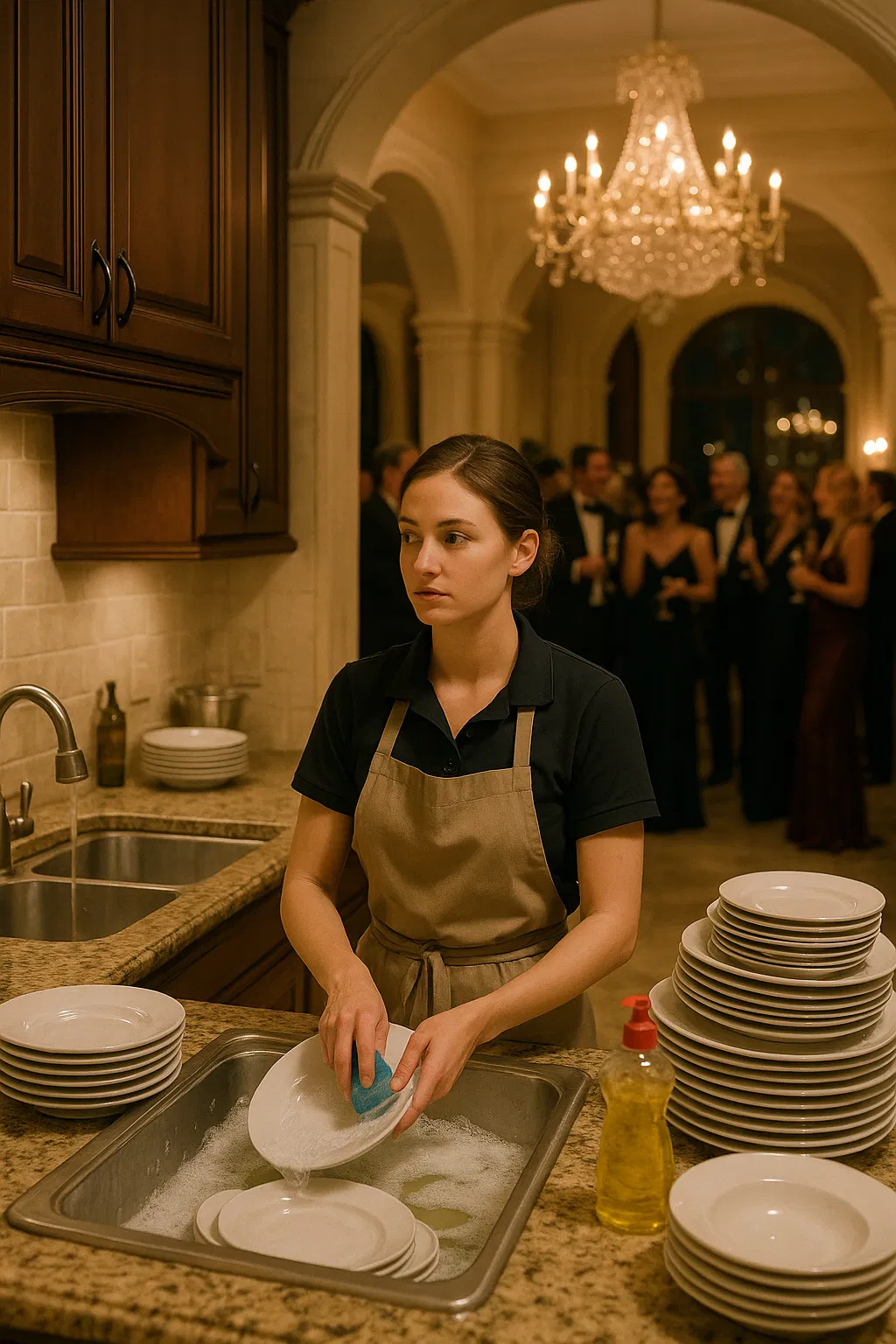My name is Tessa Cross, and two hours ago I was in my own kitchen, rubber gloves on, sleeves rolled, scrubbing dishes in warm soapy water.
Above me, in the grand ballroom of our mansion, glittering guests drank champagne under chandeliers, posing before a floral wall that spelled out The Cross Foundation Annual Gala.
It was my home, my event, my life—and not a single one of them recognized me.
Because I didn’t want them to.
Instead of a designer gown, I wore a black polo and apron borrowed from catering staff.
I slipped into the kitchen before the first guest arrived, blending into the flurry of preparations.
Nathan, my husband, had warned me how fake people in his circle could be—smiling to his face, sneering behind his back.
I wanted to see for myself who they really were when they thought I was just “the help.”
It didn’t take long. A woman in crimson satin clicked her tongue when I fumbled with a bottle of wine.
“You people should be trained better,” she muttered, never meeting my eyes.
Sasha, the event planner we had paid dearly, barked orders at me: “Apron girl! Table six needs water!”
And Eleanor, a socialite darling, dismissed me as “better suited for dishes” than serving shrimp.
So I returned to the kitchen, scrubbing plates in silence while laughter and music floated down from the ballroom.
My wedding photos hung just a hallway away, my anniversary painting lit the stairwell, yet I was invisible in my own home.
I hadn’t expected kindness, but the cruelty stung.
Charity, I realized, was less about heart than about performance.
Then a familiar voice cut through the din: “Excuse me… has anyone seen my wife?”
Nathan stood in a crisp tuxedo, champagne glass in hand, his tone casual but edged.
Guests murmured excuses, but his smile was sharp: “Strange. I thought she might be downstairs—helping with the dishes.”
And when his gaze swept the room, he found me at last.
Hands wet, face flushed, apron tied tight—I stepped into the ballroom.
Nathan crossed to me, took off my apron, dried my hands with his pocket square, and kissed my forehead.
“This is Tessa,” he told the silent crowd. “My wife. The woman this gala was dedicated to. The woman who built this life with me.”
Gasps filled the air. Sasha dropped her headset. Eleanor paled.
“She chose to spend the evening as one of the staff,” Nathan continued.
“I didn’t know she would, but I think it’s brilliant. And from what I gather… not everyone passed the test.”
Some avoided his gaze, others tried to laugh it off, but the truth lingered heavy in the room.
He took my hand, leading me onstage. “If anyone treated her as less, look in the mirror before calling yourself charitable.”
When the guests left, we sat quietly on the back patio steps, the mansion glowing behind us.
Nathan held my hand and whispered, “I’m sorry. I didn’t expect it to be so cruel.”
“I needed to see it,” I told him softly. “Not for you—for me. To remember why kindness matters more than money or status.”
We stayed there under the stars, breathing in the silence.
By morning, Nathan’s words had gone viral. Someone had filmed the moment and shared it.
Messages poured in—apologies from guests, praise from strangers, donations to the foundation doubled overnight.
Sasha quit and decided to open a bakery. Eleanor sent flowers, twice.
The world had seen what unfolded behind the chandeliers.
And me? I kept the apron. It hangs in my closet beside the gowns.
A quiet reminder that once upon a time, the richest woman in the room was the one washing dishes.
Because kindness—not wealth, not status—is the truest form of power.
The kind no gala can fake, and no diamond can buy.
